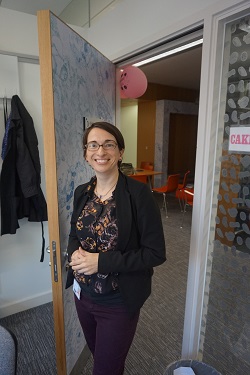Dr Kate Everett relfects on how identifying at LGBT+ can impact on mental health
 Growing up in Norfolk in the 1980s and 1990s, there was not a plethora of gay role models.
Growing up in Norfolk in the 1980s and 1990s, there was not a plethora of gay role models.
Freddie Mercury was the only gay person who I was aware of and I couldn’t have named a single gay woman; seemingly they just didn’t exist!
So, when the realisation of my own non-heterosexuality dawned on me aged 16, it literally floored me.
I had no idea that other women felt the same way as me; the sense of abnormality was intense.
I immediately panicked that my friends would somehow find me perverse, weird, tainted.
The impact of this was that I withdrew from all my friends, but particularly my female friends. I became very close to one male friend who was going through a similar experience. I didn’t feel I could talk to anyone else; to my family, to a teacher, to my other friends. I wasn’t aware of any helplines I could call.
The feelings of isolation, “otherness” and self-loathing were very damaging.
As well as withdrawing from my friends, I started missing lessons at school leading to my messing up my A-levels quite badly.
Despite this, I managed to get into university and made a very conscious and deliberate decision to “be straight”. I maintained this illusion to myself, and to others, for a further rather damaging 7 years.
Ultimately when I did start being honest with friends and family, the reaction was overwhelmingly positive. If anything, my friends were rather offended that I had thought they might react badly!
I know now that this fear came from my own internal battle to accept myself, something which led to loss of confidence, insecurity and periods of depression.
I am very lucky to have had such amazing support that once I had come out to close family and friends, I became much more comfortable and confident in myself.
Society remains heteronormative; I don’t think this is something that straight people will ever fully appreciate. I don't say this as a criticism but to try to help understanding.
My brother and sister didn't ever have to "come out" as being heterosexual. Non-straight people don’t come out once in their life; that is a fallacy. Every time I mention my partner to someone new it is a little coming out and, despite being totally comfortable in who I am now, I still have a little bit of that same nervousness. I still think twice before holding my partner’s hand in public. I know that certain sections of society see our love as wrong, or as somehow less.
My partner and I are looking to move into a more rural area but want to be sure that we move somewhere that we, as a gay couple, will be accepted.
It is human nature to want to be accepted and any rejection hurts even if my reaction is anger now rather than real pain. But I still remember what it felt like to be 16 and feel lost and alone and confused and that is why I am open in all walks of my life about who I am.
Nobody should ever feel alone and I hope that by contributing to this discussion on mental health and LGBT matters, it may help someone not feel alone.
Where to get help
We hope that sharing stories like Kate's will increase awareness and understanding and help people to reflect on their experience with their own mental health and allow people to support others who may be struggling.
We are grateful for those who have shared their experiences.
We know that the range of experiences included in this series of articles is limited – there are so many overlapping factors linked to our identity that will impact our mental health and perspective.
If any of the experiences shared have resonated with you, we would encourage you to join our staff networks, which are open to all.
We have 3 staff networks at St George’s: